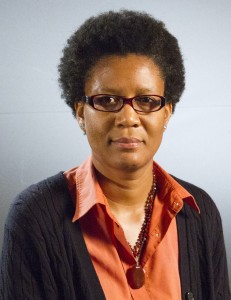Even if it has been a while since your organic chemistry lab course in college, you probably remember the time you synthesized isopentyl acetate, better known as banana oil. Besides being a mouth-watering experience, the realization that a molecule that smelled like bananas could be constructed from two molecules that smelled nothing like bananas may have sparked an interest in synthetic chemistry and scientific research. After all, laboratory courses are often a science student’s first experience in the lab and it is through those experiences that many decide to pursue research careers.
However, lab courses alone do not paint an accurate picture of a research career, says Dr. Quinetta Shelby.
“It is important for students to learn early on what life is like in the lab. Most do not realize that original research is very different from the rehearsed and verified experiments performed in lab classes,” says Quinetta. “The objective of research is not to follow someone else’s recipe, but to improve upon and tweak it by trying different ingredients and combining them in new ways.”
Quinetta Shelby is an Associate Professor of Chemistry and Director of the Chemistry Graduate Program at DePaul University. At DePaul, Quinetta teaches undergraduate and graduate level courses in organic, inorganic, and general chemistry, as well as spectroscopy, to prepare students for careers in science. As another aspect of that preparation, she mentors undergraduates in her research lab, focused on the synthesis of catalytic palladium diphosphine complexes, to give them an “opportunity to experience the research discovery process.”
For those students that love the lab and want to go on to academic careers, she recommends getting into research and teaching or tutoring as quickly as possible, in order to demonstrate seriousness and dedication.
Although Quinetta originally wanted to be a high school math teacher, a “wonderful chemistry professor who made chemistry understandable, interesting, and fun” caused her to switch her major to chemistry during her first year in college at the University of Chicago. A few years later, another professor encouraged her to attend a graduate school fair, “planting the idea that I had the ability to earn a Ph.D. and become a college professor.”
Following that path, Quinetta earned her Ph.D. in Inorganic Chemistry from the University of Illinois at Champaign-Urbana and was then awarded an NIH Research Supplement for Minority Individuals in Postdoctoral Training to conduct post-doctoral research at Yale University on the effect of phosphine ligand substituents on the formation of diaryl ethers. She began her academic career at Chicago State University, but has been part of the chemistry faculty at DePaul since 2004. As a professor, she finds it most rewarding when she can help a struggling student finally “get” a concept and understand the reasoning behind a particular synthetic methodology or reaction mechanism.
Quinetta is also a champion for women in STEM, having served on several committees at DePaul that showcase the accomplishments of women, including a selection committee that awards full tuition scholarships and research stipends to female STEM undergraduates, as well as one that selects accomplished Chicagoland women in STEM to speak DePaul’s annual Jeanne LaDuke Women in Mathematics, Science, and Technology Lecture Series.
To encourage women to enter STEM fields and also to empower women already in those fields to increase their visibility, Quinetta believes that those in positions of authority, i.e., teachers, employers, and parents, “need to clearly and effectively communicate that we can be confident in our abilities, trust ourselves, and blaze our own trails.”
When she is not teaching or in the lab, Quinetta loves to cook. Her favorite dish is peach cobbler. “I like working with my hands, so if I were not a chemistry professor, I would own my own restaurant.”

